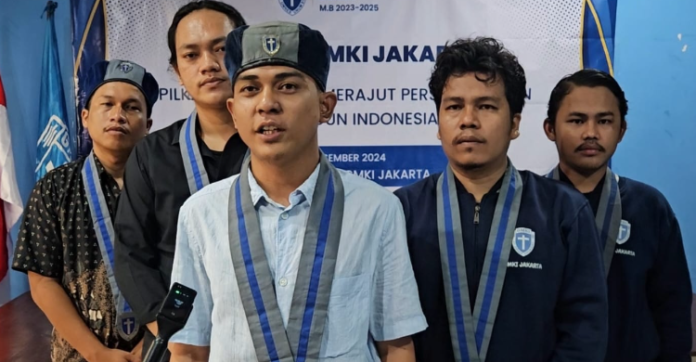The Role of Religious Organizations in Inviting the Public to Respect the Results of Regional Elections
By Marlinda Yusril )*
Simultaneous Regional Elections are an important momentum in the journey of democracy in Indonesia. Amidst various challenges, the implementation of this democratic party is a reflection of the political maturity of the community and the commitment to the democratic system that has become the foundation of the country. However, the democratic process involving various parties is also inseparable from the potential for conflict caused by differences of opinion and results that are not as expected. In this context, the role of religious community organizations (ormas) is greatly needed to maintain a conducive atmosphere and invite the community to respect the results of the Regional Elections.
The chairman of the Indonesian Christian Student Movement (GMKI) Jakarta for the 2023-2025 period, Chrysmon Wifandy Gultom, highlighted the importance of a wise attitude in responding to the results of the regional elections. According to him, the public must understand that differences are part of healthy political dynamics and should not be a reason to break the bonds of unity. This is relevant to the post-regional election conditions, where people are often trapped in the euphoria of victory or deep disappointment. Chrysmon emphasized the importance of re-weaving unity that may have been torn apart due to differences in political choices, considering that Indonesia is a country that upholds national values.
The same thing was also conveyed by the Head of the Nahdlatul Ulama (PWNU) DKI Jakarta Regional Management, KH Samsul Ma’arif, who reminded the public of the essence of democracy. Winning or losing in the Pilkada is a natural thing and must be accepted with an open heart. A wise attitude in accepting the election results is a real form of democratic maturity. KH Samsul also emphasized that whoever is elected is a leader for all, not just for their supporting group. Therefore, the public is expected to continue to support the elected leadership for the common good, while also providing constructive criticism if there are shortcomings.
Meanwhile in Papua, Pastor Jones Wenda set an extraordinary example. He appreciated the implementation of the Simultaneous Regional Elections which took place safely and peacefully in Papua. This is proof that the Papuan people are able to demonstrate maturity in democracy, and even become an example for other regions. Pastor Jones reminded the importance of maintaining security and comfort together, without fostering hostility due to differences in political choices. The message not to be provoked by hoaxes and to maintain unity is very relevant, considering that political dynamics are often exploited by certain parties to divide society.
Religious organizations have a strategic position to be the guardians of harmony in society. With a strong base at the grassroots, they have the ability to reach various levels of society and convey peaceful messages that can reduce potential conflict. In addition, respected religious figures are often role models for society, so their voices have a great influence in building a conducive atmosphere. In this case, the call from figures such as Chrysmon Wifandy, KH Samsul Ma’arif, and Pastor Jones Wenda is very important to continue to be echoed.
Respect for the results of the regional elections must also be supported by strategic steps from various elements of society, including the government and related institutions. The General Election Commission (KPU) as the election organizer has a role to ensure transparency and credibility in every stage of the regional elections, so that the results announced can be well received by all parties. On the other hand, security forces need to continue to maintain stability during and after the regional election process, to prevent potential friction that may occur.
As a society committed to the values of Pancasila, maintaining national unity is a shared responsibility. Pilkada should be an event to demonstrate political maturity, not a source of division. In this case, education to the public about the importance of accepting the results of democracy with an open heart needs to be continuously carried out. Mass media and social media can also be used to spread peaceful messages and prevent the spread of fake news that can worsen the situation.
In addition, it is important to remember that the Pilkada is not the end of the democratic journey, but rather the beginning of a shared responsibility to support the elected leader. The public must continue to monitor government programs that aim to improve the welfare of the people, regardless of who is leading. Constructive criticism is also part of healthy social control in a democracy.
Post-election, the community also has an important role to maintain the sustainability of development. Development projects that have been running must continue to be supported, regardless of the political background of the elected regional head. Togetherness in overseeing development will ensure that the results of the regional elections truly bring benefits to all parties. In this case, the spirit of collaboration between the community, leaders, and various related elements is the main key to ensuring that development runs according to expectations and can be felt in all corners of the country.
In the post-election situation, collaboration between religious organizations, the government, security forces, and the community is essential to ensure social and political stability. With a spirit of togetherness, Indonesia can continue to move forward as a democratic and harmonious country. The active role of religious organizations in inviting the community to respect the results of the election is one of the main keys to realizing this. Let’s make the election a momentum to strengthen national unity and show the world that Indonesia is a country that is able to maintain peace amidst differences.
)* the author is an observer of Indonesian democracy
